Unit 8 It must belong to Carla.Section A Grammar Focus—4c 课件(共18张PPT) 人教版九年级全册
文档属性
| 名称 | Unit 8 It must belong to Carla.Section A Grammar Focus—4c 课件(共18张PPT) 人教版九年级全册 |
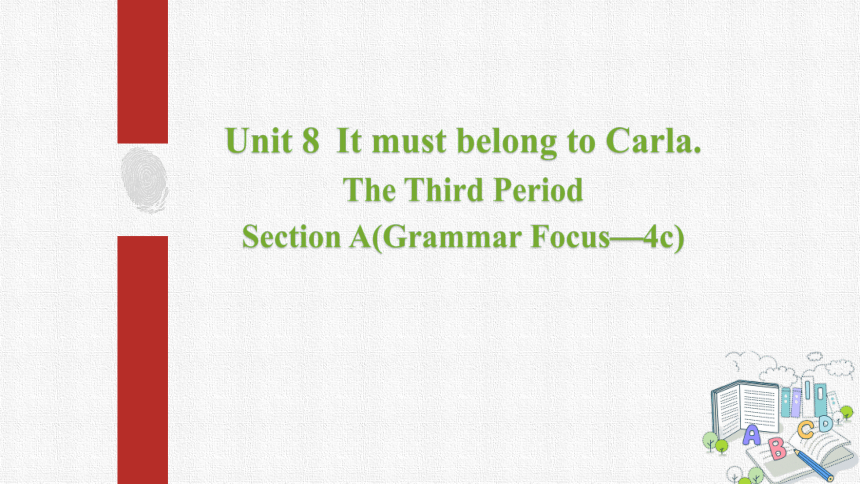
|
|
| 格式 | pptx | ||
| 文件大小 | 2.6MB | ||
| 资源类型 | 教案 | ||
| 版本资源 | 人教新目标(Go for it)版 | ||
| 科目 | 英语 | ||
| 更新时间 | 2025-01-05 16:51:26 | ||
图片预览

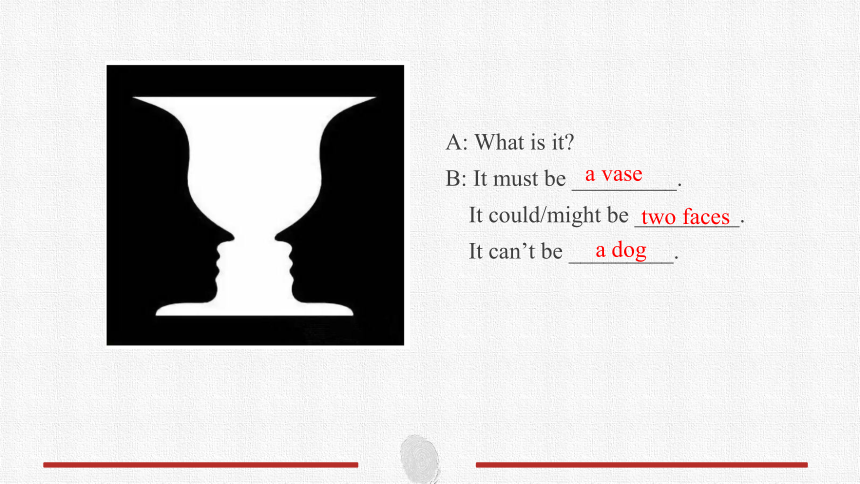
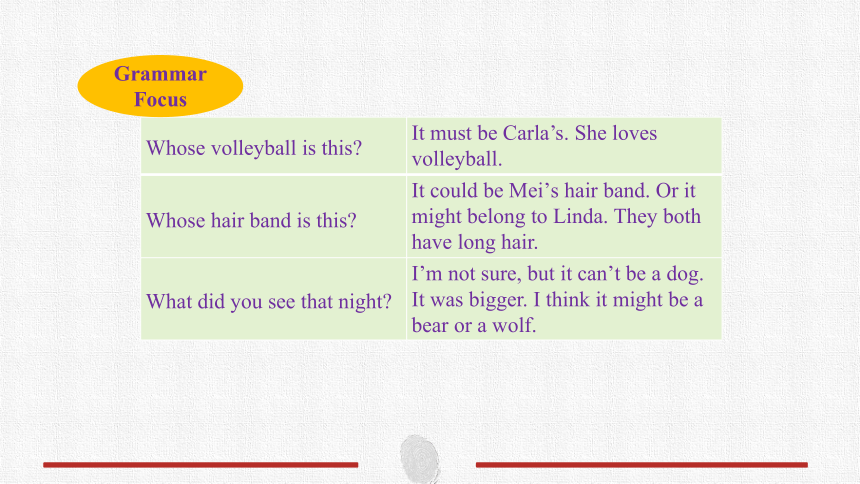
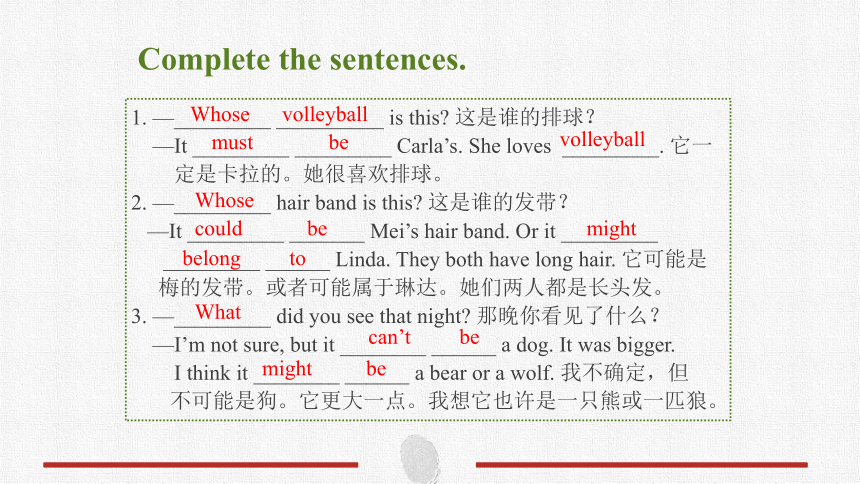
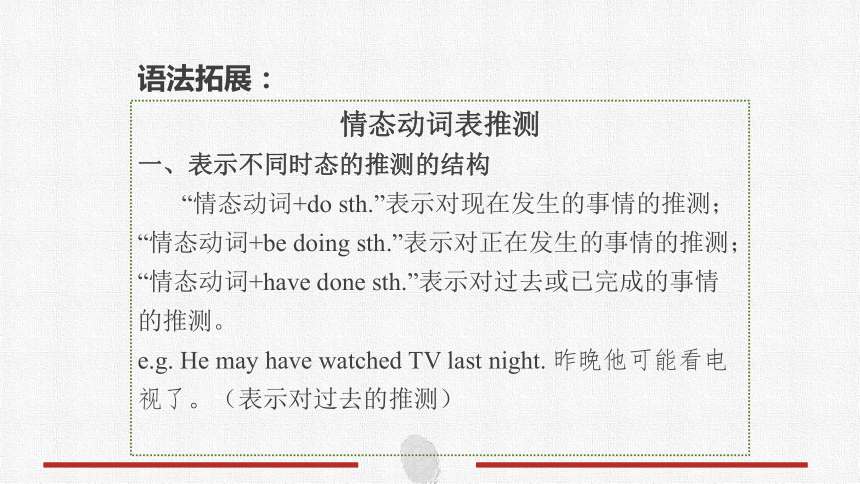
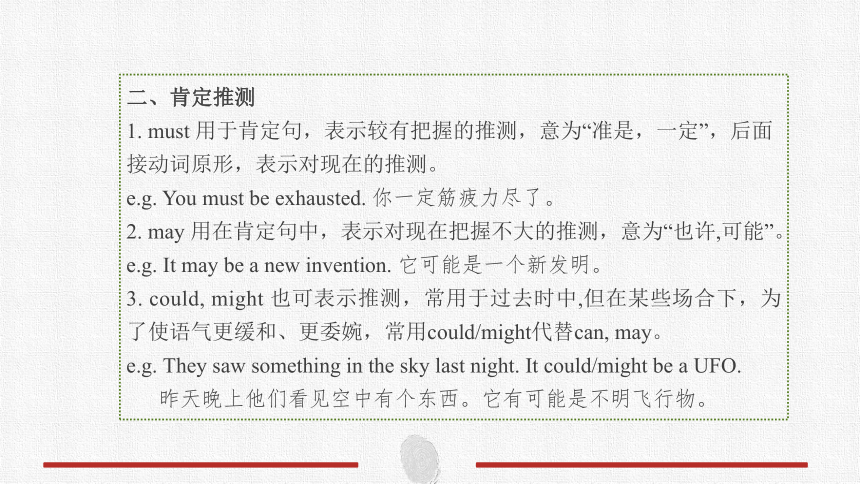
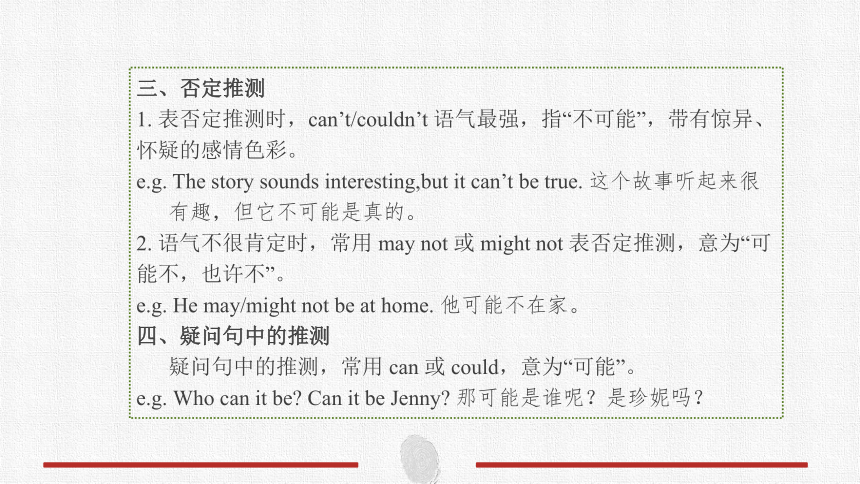
文档简介
(共18张PPT)
Unit 8 It must belong to Carla.
The Third Period
Section A(Grammar Focus—4c)
A: What is it
B: It must be _________.
It could/might be _________.
It can’t be _________.
a vase
two faces
a dog
Whose volleyball is this It must be Carla’s. She loves volleyball.
Whose hair band is this It could be Mei’s hair band. Or it might belong to Linda. They both have long hair.
What did you see that night I’m not sure, but it can’t be a dog. It was bigger. I think it might be a bear or a wolf.
Grammar
Focus
1. —_________ __________ is this 这是谁的排球?
—It _________ _________ Carla’s. She loves _________. 它一
定是卡拉的。她很喜欢排球。
2. —_________ hair band is this 这是谁的发带?
—It _________ _______ Mei’s hair band. Or it _________
_________ ______ Linda. They both have long hair. 它可能是
梅的发带。或者可能属于琳达。她们两人都是长头发。
3. —_________ did you see that night 那晚你看见了什么?
—I’m not sure, but it ________ ______ a dog. It was bigger.
I think it ________ ______ a bear or a wolf. 我不确定,但
不可能是狗。它更大一点。我想它也许是一只熊或一匹狼。
Whose volleyball
must be
volleyball
Whose
could be
might
belong to
What
can’t be
might be
Complete the sentences.
情态动词表推测
一、表示不同时态的推测的结构
“情态动词+do sth.”表示对现在发生的事情的推测;“情态动词+be doing sth.”表示对正在发生的事情的推测;“情态动词+have done sth.”表示对过去或已完成的事情的推测。
e.g. He may have watched TV last night. 昨晚他可能看电视了。(表示对过去的推测)
语法拓展:
二、肯定推测
1. must 用于肯定句,表示较有把握的推测,意为“准是,一定”,后面接动词原形,表示对现在的推测。
e.g. You must be exhausted. 你一定筋疲力尽了。
2. may 用在肯定句中,表示对现在把握不大的推测,意为“也许,可能”。
e.g. It may be a new invention. 它可能是一个新发明。
3. could, might 也可表示推测,常用于过去时中,但在某些场合下,为了使语气更缓和、更委婉,常用could/might代替can, may。
e.g. They saw something in the sky last night. It could/might be a UFO.
昨天晚上他们看见空中有个东西。它有可能是不明飞行物。
三、否定推测
1. 表否定推测时,can’t/couldn’t 语气最强,指“不可能”,带有惊异、怀疑的感彩。
e.g. The story sounds interesting,but it can’t be true. 这个故事听起来很
有趣,但它不可能是真的。
2. 语气不很肯定时,常用 may not 或 might not 表否定推测,意为“可能不,也许不”。
e.g. He may/might not be at home. 他可能不在家。
四、疑问句中的推测
疑问句中的推测,常用 can 或 could,意为“可能”。
e.g. Who can it be Can it be Jenny 那可能是谁呢?是珍妮吗?
1.A: Where’s Jean
B: I’m not sure. She __________ (is/might be/must be) in the
laboratory.
2. A: Everyone is going to the pool after school.
B: Really It __________(must be/can’t be/could be) hot outdoors.
3.A: That’s the phone.
B: Hmm. I wonder who it __________ (must be/could be/should be).
might be
must be
could be
Choose the best way to complete each sentence using the words in brackets.
4a
4. A: I wonder if these are Jim’s glasses.
B: They ____________ (can’t be/might be/could be) his. He doesn’t
wear glasses.
5. A: I hear water running in the bathroom.
B: It ______________ (could be/must be/can’t be) Carla. She was
thinking of taking a shower.
can’t be
must be
1. A: Many people are wearing coats.
B: The weather must be _______________________________.
2. A: Sally has been lying in bed all day.
B: She might _____________________________________.
3. A: This restaurant is always very crowded.
B: The food ________________________________________.
4. A: Whenever I try to read this book, I feel sleepy.
B: It can’t __________________________________________.
very cold
have a bad cold
must be delicious
be that boring
Complete these responses.
4b
A: It could be a girl’s room because it’s very
tidy.
B: I guess so. But it might be a boy’s room
because the clothes look like boys’ clothes.
Look at this picture of a room. How much can you tell about the person who lives here Is it a boy or a girl What are his/her hobbies Discuss your ideas with a partner.
4c
1. I hear water running in the bathroom. 我听到浴室里水在流淌。
(教材第60页)
hear 此处作及物动词,意为“听见;听说”,后可跟名词、代词、动词不定式(省略to)、动词 -ing 形式或宾语从句。
e.g. I can hear someone knocking at the door. 我能听到有人正在敲门。
She couldn’t hear what I said. 她没有能听到我说了些什么。
Language Points
【拓展】辨析 hear sb. doing sth. 与 hear sb. do sth.
hear sb. doing sth. “听到某人正在做某事”,强调听见的动作正在进行 I heard him singing when I walked past the shop. 我走过那家商店时,听见他正在唱歌。
hear sb. do sth. “听见某人做了某事”,强调听见的动作发生的全过程,表示此动作经常发生或动作已经完成 I often hear her sing in the evening. 我经常听见她在
晚上唱歌。
2. Whenever I try to read this book, I feel sleepy. 每当我试图去读这
本书时,我都感觉困。(教材第60页)
sleepy adj. 困倦的,瞌睡的,常与 be/feel 连用。
【拓展】sleep v.&n. 入睡,睡觉;asleep adj. 入睡的,睡着的,常与 fall 连用。
e.g. He feels sleepy and he will fall asleep soon.他很困,他马上就会
睡着的。
一、从方框中选择合适的词填空
1. —You _______ be happy with the strong public support we’ve
received.
—Yes, you are right. I’m really excited.
2. —Look! Li Ming is over there.
—No, it _______ be him. He has gone to Beijing for a meeting. 3. My mother _______ be at home,so you can go to see her.
Exercise
must
can’t
may must can’t
might
二、根据汉语意思完成句子,每空一词
1. 她不可能正在等你。
She __________ __________ __________for you.
2. 这肯定是李明的英语书。
This English book __________ __________ _______ Li Ming.
3. 这个篮球可能是鲍勃或彼得的,但是我不确定。
This basketball ________ ________ Bob’s or Peter’s, but I’m
not sure.
can’t
be
waiting
must
belong
to
might
be
4. 她的表准是停了。我去叫她。
Her watch __________ __________ __________. I will
go and call her.
5. 一定有人在偷苹果。
There __________ ________ somebody ________ apples.
must
have
stopped
must
be
stealing
Recite Grammar Focus and make sentences using modal verbs. (at least 5 sentences)
Homework
Unit 8 It must belong to Carla.
The Third Period
Section A(Grammar Focus—4c)
A: What is it
B: It must be _________.
It could/might be _________.
It can’t be _________.
a vase
two faces
a dog
Whose volleyball is this It must be Carla’s. She loves volleyball.
Whose hair band is this It could be Mei’s hair band. Or it might belong to Linda. They both have long hair.
What did you see that night I’m not sure, but it can’t be a dog. It was bigger. I think it might be a bear or a wolf.
Grammar
Focus
1. —_________ __________ is this 这是谁的排球?
—It _________ _________ Carla’s. She loves _________. 它一
定是卡拉的。她很喜欢排球。
2. —_________ hair band is this 这是谁的发带?
—It _________ _______ Mei’s hair band. Or it _________
_________ ______ Linda. They both have long hair. 它可能是
梅的发带。或者可能属于琳达。她们两人都是长头发。
3. —_________ did you see that night 那晚你看见了什么?
—I’m not sure, but it ________ ______ a dog. It was bigger.
I think it ________ ______ a bear or a wolf. 我不确定,但
不可能是狗。它更大一点。我想它也许是一只熊或一匹狼。
Whose volleyball
must be
volleyball
Whose
could be
might
belong to
What
can’t be
might be
Complete the sentences.
情态动词表推测
一、表示不同时态的推测的结构
“情态动词+do sth.”表示对现在发生的事情的推测;“情态动词+be doing sth.”表示对正在发生的事情的推测;“情态动词+have done sth.”表示对过去或已完成的事情的推测。
e.g. He may have watched TV last night. 昨晚他可能看电视了。(表示对过去的推测)
语法拓展:
二、肯定推测
1. must 用于肯定句,表示较有把握的推测,意为“准是,一定”,后面接动词原形,表示对现在的推测。
e.g. You must be exhausted. 你一定筋疲力尽了。
2. may 用在肯定句中,表示对现在把握不大的推测,意为“也许,可能”。
e.g. It may be a new invention. 它可能是一个新发明。
3. could, might 也可表示推测,常用于过去时中,但在某些场合下,为了使语气更缓和、更委婉,常用could/might代替can, may。
e.g. They saw something in the sky last night. It could/might be a UFO.
昨天晚上他们看见空中有个东西。它有可能是不明飞行物。
三、否定推测
1. 表否定推测时,can’t/couldn’t 语气最强,指“不可能”,带有惊异、怀疑的感彩。
e.g. The story sounds interesting,but it can’t be true. 这个故事听起来很
有趣,但它不可能是真的。
2. 语气不很肯定时,常用 may not 或 might not 表否定推测,意为“可能不,也许不”。
e.g. He may/might not be at home. 他可能不在家。
四、疑问句中的推测
疑问句中的推测,常用 can 或 could,意为“可能”。
e.g. Who can it be Can it be Jenny 那可能是谁呢?是珍妮吗?
1.A: Where’s Jean
B: I’m not sure. She __________ (is/might be/must be) in the
laboratory.
2. A: Everyone is going to the pool after school.
B: Really It __________(must be/can’t be/could be) hot outdoors.
3.A: That’s the phone.
B: Hmm. I wonder who it __________ (must be/could be/should be).
might be
must be
could be
Choose the best way to complete each sentence using the words in brackets.
4a
4. A: I wonder if these are Jim’s glasses.
B: They ____________ (can’t be/might be/could be) his. He doesn’t
wear glasses.
5. A: I hear water running in the bathroom.
B: It ______________ (could be/must be/can’t be) Carla. She was
thinking of taking a shower.
can’t be
must be
1. A: Many people are wearing coats.
B: The weather must be _______________________________.
2. A: Sally has been lying in bed all day.
B: She might _____________________________________.
3. A: This restaurant is always very crowded.
B: The food ________________________________________.
4. A: Whenever I try to read this book, I feel sleepy.
B: It can’t __________________________________________.
very cold
have a bad cold
must be delicious
be that boring
Complete these responses.
4b
A: It could be a girl’s room because it’s very
tidy.
B: I guess so. But it might be a boy’s room
because the clothes look like boys’ clothes.
Look at this picture of a room. How much can you tell about the person who lives here Is it a boy or a girl What are his/her hobbies Discuss your ideas with a partner.
4c
1. I hear water running in the bathroom. 我听到浴室里水在流淌。
(教材第60页)
hear 此处作及物动词,意为“听见;听说”,后可跟名词、代词、动词不定式(省略to)、动词 -ing 形式或宾语从句。
e.g. I can hear someone knocking at the door. 我能听到有人正在敲门。
She couldn’t hear what I said. 她没有能听到我说了些什么。
Language Points
【拓展】辨析 hear sb. doing sth. 与 hear sb. do sth.
hear sb. doing sth. “听到某人正在做某事”,强调听见的动作正在进行 I heard him singing when I walked past the shop. 我走过那家商店时,听见他正在唱歌。
hear sb. do sth. “听见某人做了某事”,强调听见的动作发生的全过程,表示此动作经常发生或动作已经完成 I often hear her sing in the evening. 我经常听见她在
晚上唱歌。
2. Whenever I try to read this book, I feel sleepy. 每当我试图去读这
本书时,我都感觉困。(教材第60页)
sleepy adj. 困倦的,瞌睡的,常与 be/feel 连用。
【拓展】sleep v.&n. 入睡,睡觉;asleep adj. 入睡的,睡着的,常与 fall 连用。
e.g. He feels sleepy and he will fall asleep soon.他很困,他马上就会
睡着的。
一、从方框中选择合适的词填空
1. —You _______ be happy with the strong public support we’ve
received.
—Yes, you are right. I’m really excited.
2. —Look! Li Ming is over there.
—No, it _______ be him. He has gone to Beijing for a meeting. 3. My mother _______ be at home,so you can go to see her.
Exercise
must
can’t
may must can’t
might
二、根据汉语意思完成句子,每空一词
1. 她不可能正在等你。
She __________ __________ __________for you.
2. 这肯定是李明的英语书。
This English book __________ __________ _______ Li Ming.
3. 这个篮球可能是鲍勃或彼得的,但是我不确定。
This basketball ________ ________ Bob’s or Peter’s, but I’m
not sure.
can’t
be
waiting
must
belong
to
might
be
4. 她的表准是停了。我去叫她。
Her watch __________ __________ __________. I will
go and call her.
5. 一定有人在偷苹果。
There __________ ________ somebody ________ apples.
must
have
stopped
must
be
stealing
Recite Grammar Focus and make sentences using modal verbs. (at least 5 sentences)
Homework
同课章节目录
- Unit 1 How can we become good learners.
- Section A
- Section B
- Unit 2 I think that mooncakes are delicious!
- Section A
- Section B
- Unit 3 Could you please tell me where the restroom
- Section A
- Section B
- Unit 4 I used to be afraid of the dark.
- Section A
- Section B
- Unit 5 What are the shirts made of?
- Section A
- Section B
- Review of Units 1-5
- Unit 6 When was it invented?
- Section A
- Section B
- Unit 7 Teenagers should be allowed to choose their
- Section A
- Section B
- Unit 8 It must belong to Carla.
- Section A
- Section B
- Unit 9 I like music that I can dance to.
- Section A
- Section B
- Unit 10 You're supposed to shake hands.
- Section A
- Section B
- Review of Units 6-10
- Unit 11 Sad movies make me cry.
- Section A
- Section B
- Unit 12 Life is full of the unexpected
- Section A
- Section B
- Unit 13 We're trying to save the earth!
- Section A
- Section B
- Unit 14 I remember meeting all of you in Grade 7.
- Section A
- Section B
- Review of Units 11-14
